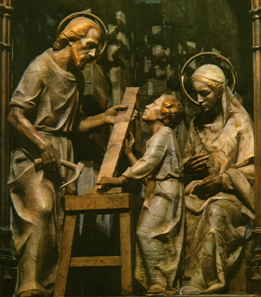 Dear Father John, What tips would you offer to a person seeking to maintain the presence of God throughout the work day?
Dear Father John, What tips would you offer to a person seeking to maintain the presence of God throughout the work day?
First, take a look at the treatment we gave this issue in the post on “Prayer – Practicing his Presence.” But since the observations we made there apply to every vocation and life-stage (parent, student, professional, home-maker…), addressing the work place specifically could be worthwhile. I would offer three tips.
Get Creative
First, do something creative to have your work space reflect the liturgical seasons. You probably already see this happening in the decoration of your parish. The colors of vestments, banners, and altar clothes changes with the liturgy. White, gold, red, purple, rose, green – each liturgical color is associated with a season, or with a particular type of feast-day. This visual variation is a powerful took for stimulating our awareness of the story of salvation, of which each one of us is an integral part. You don’t have to put colored veils all over your corporate cubicle, but it will help you to give a liturgical rhythm to the personalized décor you have there.
Avoid Run-On Sentences
Second, punctuate your work day with short breaks for prayer. When you launch into your work, make a prayer in which you offer all the work you are going to do today to God. You can do this in your own words, or simply by making the sign of the cross as you sit down at your desk or take up your shovel, or by using a prayer that you like for this purpose (I like St Francis’ prayer, for example). Then, throughout the day, step away from your work for a moment or two now and again, in order to renew your intention, or to pray for someone on your heart, or simply to tell Jesus how much you want to love him and how much you need his grace. Again, you can use your own words, or use a prayer that you like. This is like taking a spiritual coffee break. Psychologists recommend that we take a break from engaging tasks at least every two hours. So, in general, one break in the morning, one in the afternoon, and one at lunch make for a healthy work rhythm. If you can add a conscious prayer in each of these little breaks, you will find it much easier and more natural to stay connected to the Holy Spirit during the work day.
At the end of your work day, when you are closing up shop, renew your spiritual offering – hand over to the Lord the work that you have done that day, turning it in to him, spiritually speaking, the same way that you would turn in a report to your boss, or check out at the time clock.
Sometimes the challenge of finding a way to do this without being too obvious or intrusive towards your coworkers is itself a powerful tool for reminding you that God is present and active in your soul and interested in your work.
Your Secret Weapon
Third, live the Lord’s Day well. This is counterintuitive – the Lord’s Day is not supposed to be a work day, so what does it have to do with helping us practice God’s presence in the work place? Everything. If the highpoint of our week is the Sunday Mass, where each one of us gathers with all of our brothers and sisters in the faith in order to worship our Creator and Redeemer through the sacramental economy that Jesus has given to his Church, then our work week all of a sudden takes on supernatural meaning. During the week, as we put our talents to work in building up society and improving the world around us (the main purpose of human work), it is easy to forget that if our friendship with God is healthy, that activity has the same kind of redeeming value as Christ’s activity in the workshop at Nazareth. By working, we are obeying God’s commandment that we fill and subdue the world. By working, we are exercising our human prerogative of being co-creators with the Lord, stewards and gardeners of creation, releasing and developing the raw and hidden potential of the world around us. Whether you are a scientist, a brick-layer, or an accountant, your profession contributes to our God-given task of cultivating – bringing culture to – the world. But we can only give this meaning to our activity insofar as we are united to Jesus Christ, who rebuilt the bridge between God and the human race. And who do we unite our work to Christ’s work? How do our feeble and flawed human efforts get swept up into Christ’s redemption? Through the Sunday liturgy.
Ants work extremely hard; but they don’t celebrate the Lord’s Day. Their work has no redeeming value. When we live our work week towards the Sunday liturgy, all our work, however humble it may be, does take on redeeming value. This is expressed in the liturgy through the rite of the offertory. Sometimes when we put our donation in the basket we think we are doing God a favor. But actually, from a liturgical standpoint, that is the moment in which we are taking all the work we have done during the previous week and linking it, intentionally, with the work Christ did for us through his passion, death, and resurrection, which will be celebrated and re-presented during the Mass. Through the Mass, therefore, all the activities and personal encounters we have been part of during the previous week come into contact with God’s saving grace and are swept up into God’s redemption of the world. When we live the Lord’s Day well, this awareness takes deeper and deeper root in our minds, and, as you can imagine, gradually comes to impact how we practice God’s presence throughout the rest of the week. For this same reason, trying to go to Mass at some point during the week is also a powerful ally in our efforts to practice God’s presence in the workplace.
Those are a few tips. Try them out, and let us know how they help. I would also invite any of our readers who have other proven tips to share them – if something helps you come closer to Christ, chances are it could also help someone else.
Yours in Christ, Father John Bartunek, LC
Please join us in reaching thousands for Christ with authentic Catholic spirituality! Would you consider a donation? No gift is too small.


